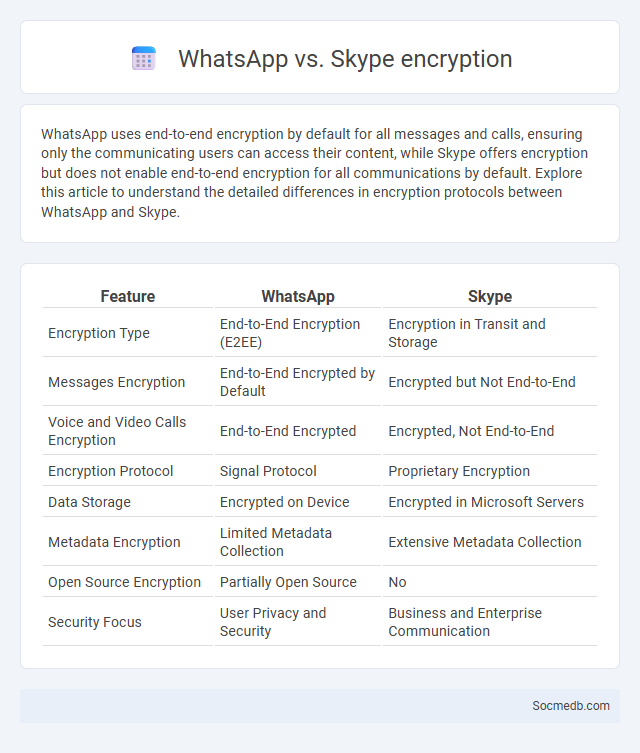
Photo illustration: WhatsApp vs Skype encryption
WhatsApp uses end-to-end encryption by default for all messages and calls, ensuring only the communicating users can access their content, while Skype offers encryption but does not enable end-to-end encryption for all communications by default. Explore this article to understand the detailed differences in encryption protocols between WhatsApp and Skype.
Table of Comparison
| Feature | Skype | |
|---|---|---|
| Encryption Type | End-to-End Encryption (E2EE) | Encryption in Transit and Storage |
| Messages Encryption | End-to-End Encrypted by Default | Encrypted but Not End-to-End |
| Voice and Video Calls Encryption | End-to-End Encrypted | Encrypted, Not End-to-End |
| Encryption Protocol | Signal Protocol | Proprietary Encryption |
| Data Storage | Encrypted on Device | Encrypted in Microsoft Servers |
| Metadata Encryption | Limited Metadata Collection | Extensive Metadata Collection |
| Open Source Encryption | Partially Open Source | No |
| Security Focus | User Privacy and Security | Business and Enterprise Communication |
Overview: WhatsApp and Skype Encryption Methods
WhatsApp employs end-to-end encryption powered by the Signal Protocol, ensuring that only the communicating users can read the messages, with no access for WhatsApp or third parties. Skype utilizes a combination of encryption methods, including AES 256-bit for call encryption and TLS for data transport, but does not provide default end-to-end encryption for all communication types. Both platforms prioritize user privacy, yet WhatsApp's robust end-to-end encryption offers a higher degree of message confidentiality compared to Skype's traditionally centralized encryption model.
What Is End-to-End Encryption?
End-to-end encryption is a security measure that ensures only you and the intended recipient can read the messages exchanged on social media platforms. This technology encrypts data on your device and decrypts it only on the recipient's device, preventing unauthorized access by hackers or service providers. By implementing end-to-end encryption, your private conversations remain confidential and protected from potential surveillance or data breaches.
WhatsApp’s Approach to End-to-End Encryption
WhatsApp employs advanced end-to-end encryption to ensure that Your messages, calls, photos, and videos are securely protected from unauthorized access, making communication private and confidential. This encryption protocol uses the Signal Protocol, which generates unique encryption keys for each chat, preventing third parties, including WhatsApp itself, from intercepting or reading Your data. By prioritizing security and privacy, WhatsApp enhances user trust and sets a standard for secure social media messaging platforms.
Skype’s Encryption Protocol Explained
Skype employs a complex encryption protocol combining AES-256 for end-to-end media encryption with RSA 2048-bit keys for secure key exchange. This hybrid cryptographic approach ensures that voice, video, and instant messages are protected against eavesdropping and unauthorized access. Skype's encryption framework, leveraging TLS for signaling security and robust peer-to-peer architecture, maintains user privacy during communication sessions.
Comparing Encryption Standards: WhatsApp vs Skype
WhatsApp uses end-to-end encryption based on the Signal Protocol, ensuring that only the communicating users can read the messages, which enhances privacy and security. Skype employs a combination of AES and TLS encryption but lacks default end-to-end encryption for all conversations, making it less secure compared to WhatsApp. For users prioritizing strong encryption standards in social media communication, WhatsApp offers superior confidentiality protections.
Data Security: Transmission and Storage
Data security in social media involves encrypting your information during transmission and secure storage to protect against unauthorized access. Robust protocols like HTTPS and end-to-end encryption ensure that personal data remains confidential while being sent across networks. Properly managed data centers and stringent access controls help safeguard stored social media data from breaches and cyberattacks.
Vulnerabilities and Security Gaps
Social media platforms often face vulnerabilities such as weak authentication protocols, inadequate data encryption, and susceptibility to phishing attacks. These security gaps expose users to risks including identity theft, unauthorized data access, and misinformation campaigns. Enhancing multi-factor authentication, regular software patching, and user education are critical for mitigating these threats effectively.
User Privacy: Metadata and Message Content
User privacy on social media platforms is critically affected by both metadata and message content, as metadata reveals location, time, and device information that can be exploited to profile users. Safeguarding message content through end-to-end encryption ensures that only the intended recipients access the communicated information. Comprehensive privacy policies and user control over metadata sharing are essential to mitigate risks of data breaches and unauthorized surveillance.
Encryption in Group Chats: WhatsApp vs Skype
Encryption in group chats ensures your conversations remain private and secure from unauthorized access. WhatsApp employs end-to-end encryption (E2EE) by default for all group chats, using the Signal Protocol to protect messages from interception. Skype, while offering encryption for individual calls, lacks full E2EE in group chats, which may expose your communication to potential security risks.
Final Verdict: Which Platform Offers Better Encryption?
When comparing social media platforms for encryption, Signal provides the strongest end-to-end encryption by default, ensuring messages remain private between sender and receiver. Facebook Messenger offers optional encryption via Secret Conversations, but regular chats are not encrypted end-to-end, exposing user data to potential access. For maximum security, Signal's open-source protocol and default encryption make it the preferred choice for privacy-conscious users.
 socmedb.com
socmedb.com